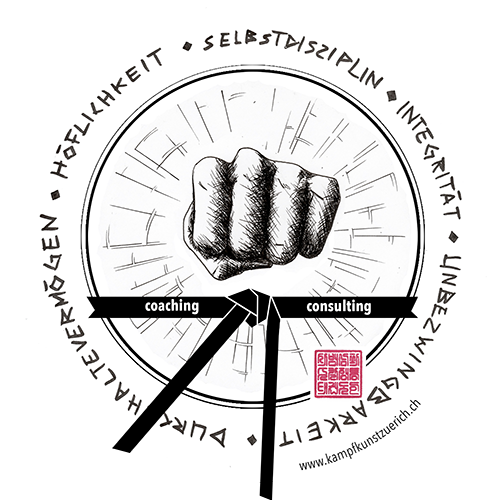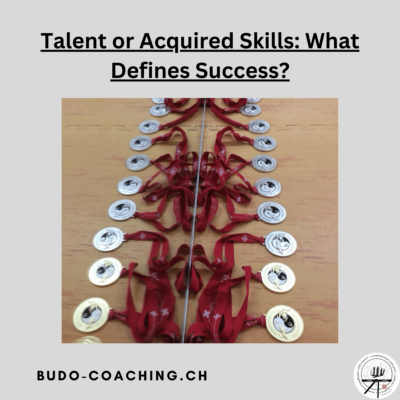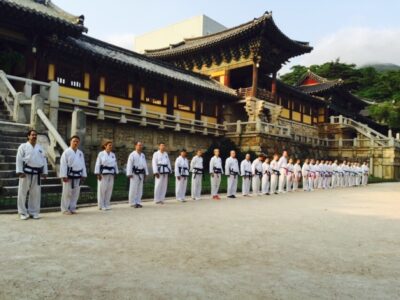What defines successful people? Maraike is a very smart and capable individual but early this…

Voice your opinion: 5 sentences you can practice at work
You don’t have to shout to be heard, seen or taken seriously
Are you one of those quiet, friendly, considerate people who are easily intimidated? Are you often annoyed that you have given up your own point of view too soon?
When voicing your opinion, you communicate effectively, if you send verbal and non-verbal signals that show determination and self-assurance.
As in a self-defense situation, it is not just about whether you can successfully ward off a physical attack, but rather whether you can stand your ground by formulating what you need, feel, think and want in a clear, unmistakable and firm manner. De-escalation is often harder than throwing a kick or a punch at someone.
Most of the time we know what we want, but we don’t dare to say it. Practice can help develop your assertiveness skill. Ever tried with Budo-training?
Here is a selection of 5 sentences you can try at your workplace to position yourself as a competent and valuable team member, who can speak up in a friendly but assertive manner.
1️⃣ Colleague interrupts all the time und you tend to back off
"I value your opinion, we'll get to that in a moment, but first let me explain my point of view"
Such a phrase is gentle, assertive, and puts you and your colleague at the same level in terms of importance and validity of what you can contribute. With friendliness and professionalism, you will have your say without allowing misunderstandings or being ignored, while showing that you are willing to start a dialogue if based on mutual respect.
2️⃣ Colleague blocks other suggestions and ignores important details
"I think your suggestion is good, but allow me to point out that..."
When a co-worker, or even your boss, is being stubborn and missing important criteria, you can use tact and diplomacy to make a difference.
Make it immediately clear that you overall like their idea, but that there is an important, crucial detail that needs to be considered. This way, you step in with self-confidence and determined but also getting the attention needed before you “attack” with your own counterarguments.
3️⃣ Customer is upset and screaming at you
"Just a minute, I want to make sure I understand the situation correctly before you continue"
No one in an upset state, busy giving vent to their rage, likes to be interrupted. However, interrupting politely with this sentence, you show interest and understanding. Because that’s what even the angriest clients are seeking: they want to make sure that they are understood and that they can be helped with their problem.
Remain objective and relaxed, look at the other person in the eyes and show that you take the situation seriously by addressing the problem and wanting to find a solution.
4️⃣ Your suggestion is shrugged off with skepticism
" This is my area of expertise, I know what I'm talking about, trust me"
It’s important to make it clear that you have the skills and experience to offer a well- informed, relevant opinion. With such a statement, you stand your ground and claim in a gentle, professional but firm tone your place.
5️⃣ Your boss refuses the budget for a project that you think is very important
"Please listen to me before you decide against it: the results of my analysis show the benefits we would draw by implementing this project".
This sentence is also friendly, self-assured and at the same time useful, for example if you push for a project that the team, colleagues, or the boss reject.
Often, we’re stuck in our own ways and don’t listen openly enough to others, with the risk of missing the opportunity to improve or streamline certain processes.
Thanks to the first request, you bring yourself in politely and show with your well-research arguments that you know what you are talking about. If you prepare your points accurately and present them clearly, it will be easier and easier for you to assert yourself and gain recognition in the process.
Keep calm
Another important aspect is to keep calm, like a samurai would.
A samurai would enter a fight in a “mushin no shin” state; “mushin no shin” refers to a state of mind that can be translated as “consciousness without consciousness” or “mind with no mind”.
So facing a confrontation with a clear and empty mind, acting intuitively, with no hesitation.
Martial artists train a lifetime to be physically and mentally fit, with the aim, should a fight ever occur, to meet the opponent in that ideal state where they:
- stay calm,
- feel neither anger, fear nor self-awareness
- perceive, feel and read the opponent
- control their emotions and act effectively
This muhsin state, calm and controllled, is crucial if you don’t want to lose the upper hand in a verbal or physical argument: the goal is to form a kind of inner distance between thinking and speaking and to develop a neutral, open, non-judgmental, flexible mindset:
🥋 Letting go of prejudices – without over or underestimating the opponent
🥋 Letting go of clouding emotions that only get in the way and jeopardize victory
Women who attend our self-assertion courses often find it difficult to stand out in the professional environment and to voice their opinion. They feel no-one considers them in meetings; others may feel that their contribution doesn’t count at all, so they hide in the back; others remain silent for fear of embarrassment or that they might say something wrong.
Many of them experienced in several occasions that their politeness and consideration were misunderstood as weaknesses or lack of direction. In coaching they learn that they can stand up for themselves and learn that being loud or putting themselves in the spotlight is not necessarily a prerequisite for drawing attention and being heard.
This is how self-assertion works in everyday life
Self-assertion means being aware of your own boundaries and clearly stating them. Clear, articulate words, self-confident posture and action do not rule out politeness. On the contrary.
As you know, our communication consists of:
- Content, i.e., what we say,
- Voice, how we transport this content and
- Body language, which, by the way, makes up for the largest part of the messages we send out.
The fact is that we manly remember our impressions- with what gesture, mimic or emotions someone spoke and made us feel – more than what was actually said.
Politeness coupled with firmness can therefore be a powerful tool to ensure you are heard, respected, and seen.
CONCLUSION
If you are friendly and polite by nature, you should stick to it and climb the career ladder with calm and confidence. Practice every day how to make yourself heard, raising attention through your competence and by finding the right tone.
Look at verbal attacks and rejections you face as an opportunity to train your self-defense tactics like in a sport contest.
A basic principle of self-defense teaches to first seek the path of de-escalation to defuse a tense situation. In the ideal case, instead of attacking straight away or remaining silent, paralysed by fear, you learn to steer aggressive behaviour in a different direction by being smart and keeping strong inside.
This principle can also be applied in our daily battles. With a little practice, you will have the confidence to successfully deal with people trying to overrule you and master uncomfortable situations like a samurai.
Would you like to start strengthening your assertiveness muscles with us? You will learn how to affirm yourself better and unleash power you did not even know you possessed. In our course we will help you to leave your comfort zone. As you become aware of your physical sources of strength and energy, you will free your mind, switching off limiting beliefs. The work-out will impact your posture. You will learn to assert yourself more easily, get more comfortable with speaking up, advocating for yourself and to cope with setbacks. Click here for our self-assertion course. Register now!



